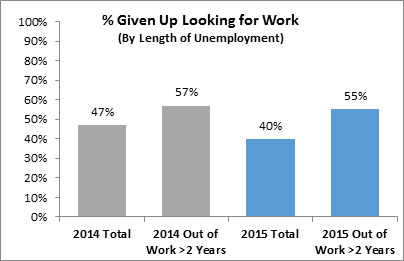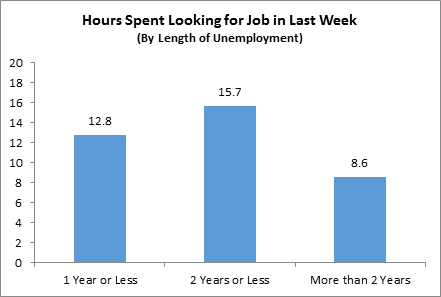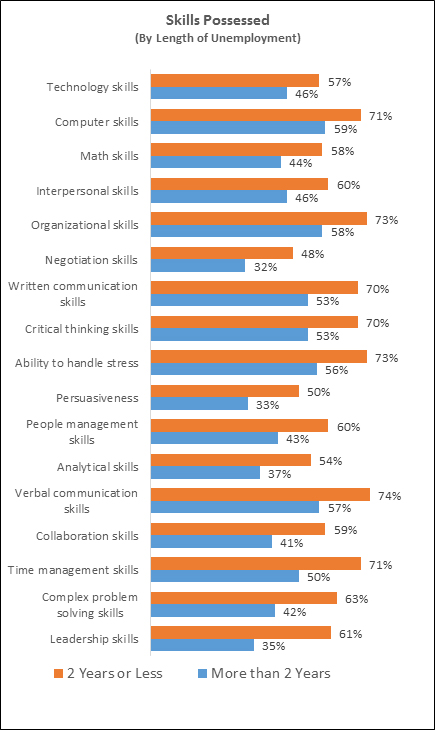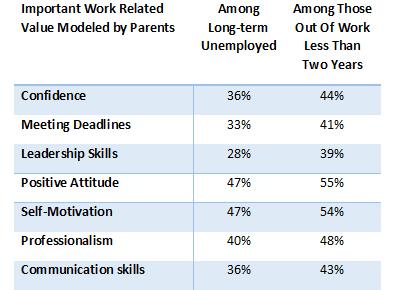Untitled Document

To: Interested Parties
From: Sarah Simmons, Vice President, Senior Consultant, Nielsen, Jennifer Nice, Research Director, Nielsen
RE: Spring 2015 Survey of the Unemployed
Date: May 20, 2015
The following memo includes results from a study where respondents met the following qualifications to participate in the study:
- U.S. resident
- Age 18+
- Mix of gender
- Unemployed but capable of working (excludes those who are currently retired, choose to stay at home and those who are unable to work due to a long-term disability)
- Stat testing was done at the 95% confidence level
This report covers the U.S. total and by how long respondents have been out of work; whether they receive unemployment benefits or not; gender; and state oversamples.
Two out of five unemployed Americans have completely given up looking for work, despite the fact that there are positive indications about the job market overall.

Forty percent of the unemployed say they have completely given up looking for work. And, the longer they have been out of work, the more likely they are to report giving up. In fact, for the long-term unemployed (more than 24 months), more than one-half say they have completely given up (55%) compared to just 21% of those who have been unemployed for three months or less.
In addition, 48% say they have not had an interview in the previous month and for the long term unemployed the numbers are dramatically worse – 72% of the long term unemployed say they have not had an interview in the last month. And of those who have not had an interview in the last month, more than three-quarters (77%) have not had an interview since 2013.
Despite these negative indications, there are some bright spots that would indicate an improvement in the overall market. In 2015, more of the unemployed report that they quit their last job and fewer reported that they were laid off than in the 2014 survey of the unemployed. In 2015, 28% say they were laid off, compared to 36% in 2014. In addition, 19% say they quit their job in 2015, compared to 15% in 2014.
The ranks of the long-term unemployed are growing–and this population is struggling. The long-term unemployed are defined as those who have been out of work more than two years. They are older, less hopeful and unwilling take a less than ideal job and spending less time each week on their job search.
The mean age of those who have been unemployed for two years or more is 41.5 years, compared to between 35 and 37 years old for those who have been unemployed for less than one year. Additionally, 39% say being “too old” is holding them back in their job search (compared to one-quarter or less for those unemployed one year or less).
They are also less hopeful – nearly one-third say they are not at all hopeful they will find a job soon (compared to less than two out of five of the more recently unemployed). One out of five of the long-term unemployed do not think they will find a job in the next six months (compared to 3% of those who have been out of work for less than three months), and nearly one-third of the long-term unemployed do not feel confident they will find work in a reasonable amount of time (compared to 5% of those recently unemployed).
Despite the fact that one-half of the long-term unemployed report a willingness to take whatever position is available, there is a significant portion of this population who are not willing to take available positions: 25% report an unwillingness to accept a job below their most recent pay level (25% disagree with the statement “I’m willing to accept a job below my most recent pay level,” compared to 15% of those recently unemployed).They are also less likely to accept contract or freelance positions – 26% disagree that they would take a contract or freelance position, compared to 15% of those who have been recently unemployed. Significantly more of the long-term unemployed report that they will only accept a job they really want to do (43% compared to just 31% of the more recently unemployed).
Not surprisingly, they are more likely to agree they find it hard to keep their effort level high in their job search (81% of the long-term unemployed compared to just 71% of the recently unemployed).
 All of these factors may contribute to the number of hours they are putting into their job search – the long-term unemployed report spending an average of 8.6 hours looking for work in the last week (vs. nearly 16 hours for those unemployed for two years or less and nearly 13 hours for those unemployed one year or less) and nearly one-third say they spent zero hours looking for work last week. This is well below the mean of 18.5 for the most recently unemployed. And, their time allocation reveals more time researching and applying but significantly less time following up on opportunities and interviewing, the activities that might suggest some success in their search.
All of these factors may contribute to the number of hours they are putting into their job search – the long-term unemployed report spending an average of 8.6 hours looking for work in the last week (vs. nearly 16 hours for those unemployed for two years or less and nearly 13 hours for those unemployed one year or less) and nearly one-third say they spent zero hours looking for work last week. This is well below the mean of 18.5 for the most recently unemployed. And, their time allocation reveals more time researching and applying but significantly less time following up on opportunities and interviewing, the activities that might suggest some success in their search.
They are also unwilling to relocate. Fifty-two percent say they are not willing to relocate to another city or town, compared to about one-third for those who have been unemployed for less than one year.
And, in very practical terms a lower percentage of the long-term unemployed are participating in their job search by doing traditional activities including: visiting/research online job boards, visiting prospective companies’ web sites, posting resumes online, going to job/career fairs, vising professional networking web sites or working with a temporary staffing agency.
The very real outcome for many of these long-term unemployed respondents is virtually no interviews – 87% report their last interview was in the fourth quarter of 2013 or sometime before that.
The long-term unemployed have a skills gap–a factor that is likely undermining their search.
While 84% of the long-term unemployed agree they feel like they know how to go about finding a job, this is 10-points lower than the recently unemployed (95% agree they know how to go about finding a job). The majority of the long-term unemployed also do not feel like they have the resources to look for a job (53% compared to just 39% of those who are recently unemployed). One-half of the long-term unemployed say they expected their job search to be difficult, but that it has been more difficult than they expected. 
And, our research suggests they have a significant gap in the skills they report having, compared to what they believe employers are looking for. They are less likely than those who have been out of work two years or less to say they have the following skills that matter to employers. They are especially less likely to say they have leadership skills, complex problem solving skills, time management skills, collaboration skills, verbal and analytical skills, people management skills, stress management, critical thinking skills and written communication. They did not rate themselves higher on any skill set than those who had been unemployed for less than one year.
Despite this skills gap, there seems to be virtually no difference in education levels between the long term unemployed and those have been unemployed for less than one year – the groups are statistically identical. In addition, the long term unemployed are no more likely to report planning to go back to school or currently being in school. However, they are more likely to have already gone back to school – 11% say they have already gone back to school.
While the long-term unemployed do not report significant differences in their upbringing, they are less likely to report learning some work values from their parents.
The long-term unemployed are not more likely to have been raised by parents who had a hard time keeping a job or who were struggling in their career, or in households that were financially insecure. In fact, the long-term unemployed are slightly more likely to say they are in worse financial shape than the family with whom they were raised.
However, they are less likely to report that their parents modeled some important values for them compared to those who have been out of work for two years or less:
- 57% say their parents modeled a strong work ethic (compared to nearly 7 in 10 (69%).
- 45% report their parents modeled a desire to learn and grow (compared to 52%).
- About one-third (36%) say their parents modeled confidence (compared to 44%)
- About one-third (32%) say their parents modeled meeting deadlines (compared 41%)
- 28% say their parents modeled leadership skills (compared to 39%).
- 47% report their parents modeled a positive attitude (compared to 55%)
- 47% report their parents modeled self-motivation (compared to 54%)
- Two-in-five modeled professionalism (compared to 48%)
- Finally, 36% say their parents modeled communication skills (compared to 43%).

These factors contribute to a challenging landscape for the long-term unemployed.